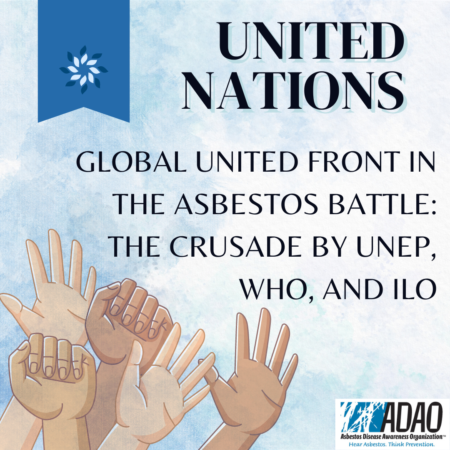Posted February 29, 2024
 The Asbestos Disease Awareness Organization (ADAO, is the largest independent 501(c)(3) nonprofit dedicated to preventing asbestos exposure and eliminating asbestos-related diseases through education, advocacy, and community initiatives. ADAO works with organizations worldwide to raise awareness about the dangers of asbestos and help educate global citizens on how to protect themselves and their communities from asbestos. We also work to ban the use of asbestos worldwide.
The Asbestos Disease Awareness Organization (ADAO, is the largest independent 501(c)(3) nonprofit dedicated to preventing asbestos exposure and eliminating asbestos-related diseases through education, advocacy, and community initiatives. ADAO works with organizations worldwide to raise awareness about the dangers of asbestos and help educate global citizens on how to protect themselves and their communities from asbestos. We also work to ban the use of asbestos worldwide.
The collaborative endeavors of the United Nations Environment Programme (UNEP), World Health Organization (WHO), and International Labour Organization (ILO) underscore a pivotal worldwide initiative to mitigate asbestos exposure risks. All three organizations champion the need for modern legal frameworks, global cooperation, safer alternatives to asbestos, and enhanced public awareness to reduce asbestos hazards and strengthen global public health effectively.
The UNEP’s Strategic Blueprint
The UNEP’s “Options for addressing asbestos contaminants in products and the environment” outlines a strategic global approach to asbestos risk management. It highlights the importance of global collaboration, legal framework revitalization, and endorsing non-asbestos alternatives. By delineating the adverse health and environmental impacts of asbestos, the paper presents strategies for minimizing exposure and promoting health safety, marking a significant advancement in international efforts to manage asbestos risks.
UNEP’s Insight on Economic Costs
According to the section, “Economic cost of asbestos”, there is ample and ongoing evidence that the mismanagement of asbestos directly results in elevated healthcare expenses outweighing any benefits. The paper states that the estimated lifetime cost for patients with asbestos-related diseases reaches US$11 billion.”
UNEP’s Global Strategy
UNEP advocates addressing asbestos contamination through international cooperation, legal reforms, and promoting safer substitutes. This initiative is crucial for reducing exposure and protecting public health globally.
2006 WHO and ILO Asbestos Elimination Resolutions
These resolutions underscore the grave implications of asbestos exposure, recognizing all asbestos forms as carcinogenic and citing that asbestos causes approximately 100,000 worker deaths annually. They highlight the elevated risks in specific scenarios like asbestos removal and building maintenance, acknowledging strides towards asbestos banning and developing safer alternatives to prevent occupational diseases and fatalities from asbestos.
Legislative Momentum in the U.S.
The Alan Reinstein Ban Asbestos Now (ARBAN) Act in the U.S., named after an asbestos-related disease victim, seeks a comprehensive ban on asbestos. This act represents a significant stride towards global asbestos elimination, aligning with international health standards.
Collaborative Efforts for a Healthier Future
The cooperation between UNEP, WHO, and ILO showcases a holistic approach to combating asbestos-related diseases. Their unified call for action provides a framework for improving national asbestos management policies, with the Alan Reinstein Ban Asbestos Now Act highlighting the importance of national policies in combating asbestos.
Looking Ahead: Your Voice Matters
The ongoing battle against asbestos benefits from the guidance of UNEP, WHO, and ILO and is coupled with advocacy, research, and policy development. Global collaboration and a deep commitment to public health are essential for achieving a future free from the harmful effects of asbestos. These collective efforts and legislative actions mark significant progress towards an asbestos-free world.
If you live in the United States, you can email your Representatives, urging them to ban asbestos by passing ARBAN. Anyone worldwide can get involved with Global Asbestos Awareness Week (GAAW), where ADAO and partners share life-saving information and resources for seven days and uplift the stories of those most affected by asbestos.
Linda Reinstein
